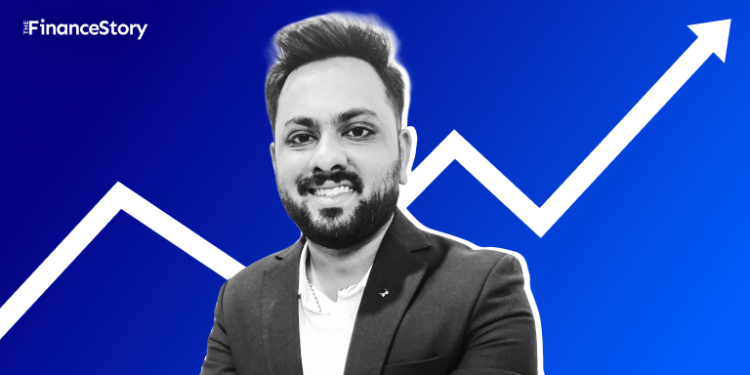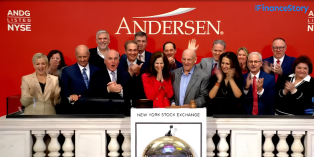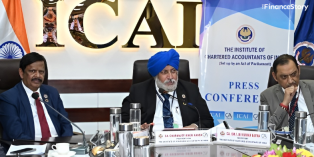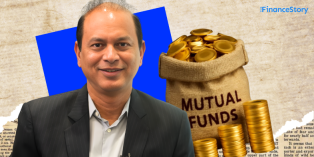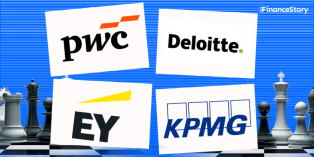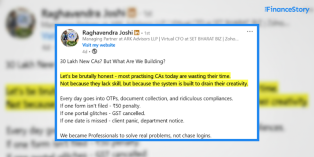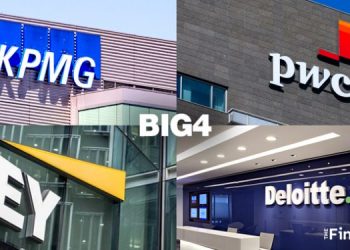- Hi, I am Vipul Jain, a Chartered Accountant and a Resident Entrepreneur at Antler, a Global Venture Capital firm with a fund size of $300 million.
- With good business acumen at my disposal, I realized early on in my career that entrepreneurship is my thing!
- After working with large business enterprises in Bangalore, the start-up capital of India, I was keen to explore how startups build innovative businesses at a fast pace and with limited resources.
- Here is how I gained a solid understanding of how startups function and started on my own.
I knew I would be an entrepreneur someday
My father is a businessman, so watching him build his textile business, cross-sell or acquire customers gave me a lot of valuable insights. These experiences shaped me and helped me understand the fundamentals of business.
On the career front, I decided to pursue Chartered Accountancy, and there started an amazing journey.
In my third year of internship, GST was introduced, and the managing partner of the firm put me in charge of that department.
I was constantly advising clients, helping them with the transition to GST, etc. At various seminars, I addressed questions on the impact of GST on startups, HR policies, and so on.
It was during this time that I started realizing my strengths and knew that I would become an entrepreneur someday!
Starting with Grant Thornton… a mindful decision
After qualifying as a Chartered Accountant in 2017, it was time to address the question – What Next?
I decided to explore various business verticals and industries from governance, risk, and operation perspectives.
And consulting was one of the best ways that would’ve led me there… I joined Grant Thornton as a Consultant in Risk Advisory Services.
I got to work with a diversified set of teams there. More importantly, I got opportunities to work on engagements beyond internal audits, that were more focused on risk advisory, management consultancy, operations optimization, and so on. Grant Thornton gave me the flexibility to interact with multiple industries.
I received a lot of positive feedback from the management.
This made me think, “Perhaps with this business acumen and skill set I should experiment further.”
Keen to explore how startups build innovative businesses
After working with large business enterprises, that too in Bangalore, the start-up capital of India, I was keen to explore how startups build innovative businesses, at a fast pace and with limited resources.
I got an opportunity with EY in their Transaction Advisory team; a perfect role to get closer to the venture capital and startup ecosystem.
At EY, I was working with a team largely focused on transactions, business model structuring, fund structuring, M&A, regulatory matters, etc.
Pretty much every day we were advising different types of founders from pre-seed to unicorn startups. We worked with some top-tier VCs as well.
In fact, during my early days at EY, I was considering joining an entrepreneurial program from IIM-A and had made up my mind to go on a sabbatical.
That’s when Vinay, my Director, and mentor at EY advised me otherwise. He insisted I first seek hands-on experience and consider an academic program later on.
It was a tough call though, but I decided to choose experience over a program. And trust me, when I reflect, the experience has just multiplied with time and enabled me to do a lot more.
It helped me become a better consulting professional and I acquired additional skill sets that later came in handy on multiple occasions.
Getting my hands dirty… joining an early-stage startup
By now I had spent a good amount of time with start-ups as an advisor, but I wanted to experience the journey of building things from the founder’s lens.
I decided to join a very early-stage startup Konnectbox, a B2B Marketplace for Manufacturers and Retailers.
Initially, I was building the Finance and Legal function for the startup and contributing to strategic decisions. However, soon after I started getting involved in micro-projects, more specifically I was leading SaaS-based product development projects.
Not only that but I got involved in the business as well. I looked at hiring, built the domestic business from zero to one, interacted with 100-plus manufacturers, spoke to a lot of customers, and whatnot.
Then I understood why it is important to understand customers’ needs, what the pain points are, and what is it that the company or others in the market are not solving.
When I joined them, you know what mattered more? It was not my core financial skills as a CA, but my ability to experiment and my business acumen.
First, be an advisor or spectator, then get your hands dirty and help other start-ups grow, and finally start your journey. This is what KB made me realize.
This was the final push for me to start my own.
Finally working on my entrepreneurial journey – Antler’s Residency Program
I was working on multiple business ideas but ultimately settled on building a SaaS product.
But for a non-tech guy, it is quite difficult to bring ideas to life. Therefore, I started searching for the right tech co-founder.
It was taking longer than usual, so I started learning no-code. By learning no-code, you can create application software without even writing a single line of code.
I finally built a prototype app.
This was a eureka moment for me. I realized that there are a lot of possibilities out there, and we can possibly do anything we want.
Days passed and I still couldn’t find that one co-founder. That’s when my friend Rohit Jain came to my rescue.
He told me about this 14-week residency program in Antler – a global early-stage VC firm, headquartered in Singapore.
At the end of the Residency, I would have the opportunity to present to the Antler India Investment Committee for investment. Apart from providing a platform to find a co-founder, the Antler residency program also supports founders with their structured entrepreneurial sessions and mentorship. I could potentially find my co-founder from a diverse pool of founders
It was exactly what I needed. I said, “Why not give it a shot?”
The first step I took was to apply through Antler India’s official website. I had to provide them with some general pieces of information about me, my thesis, and my CV.
When my application got approved they called me in for multiple rounds of interviews, thankfully I got selected.
As an entrepreneur in residence, I am pursuing my entrepreneurial journey and independently advising/helping fellow residents and a couple of other start-ups to venture into the market.
My usual day looks pretty interesting and packed. It involves a lot of meet-ups with startup founders, structured and unstructured entrepreneurship insights sessions, and multiple ideations to build processes with various fellow residents, to name a few.
How finance professionals can get involved in the startup ecosystem
The four most effective paths that will get you into the start-up ecosystem would be:
- Investment banking or VC: This space is linked to the startup ecosystem. You can interact with a lot of founders, can work on your skill set, and figure out what you want to do. This space is opening up for CAs as well because now everyone understands that CAs are not just about auditing or tax or consulting, they play a lot more strategic role in building a business.
- Transaction Services: You can consider getting into transaction advisory where you get to do due diligence or business or transaction structuring. This will give you exposure to a variety of start-ups.
- Joining the founding team: If you get the opportunity to join the founding team of any startup, preferably pre-seed or seed, then consider it. That is a fantastic way of learning the intricacies of building a startup. I know joining an early-stage startup may not seem appealing for various reasons, but this would shape your entrepreneurial journey, trust me.
- Entrepreneur in residence: Many companies are coming up with this sort of job profile. It requires a lot of technical skills, solid business acumen, grit, communication skills, and the ability to execute plans. As a resident entrepreneur, you can navigate your entrepreneurial journey very smoothly, with like-minded people.
The startup community is very much open to helping each other, so reach out to anyone and everyone who can add value or give you a better perspective on your journey.
Advice from a CA to future startup founders
If you are serious about going the startup route, one of the most important steps for you would be getting the MVP (minimum viable product) out soon. Get it tested by the users.
Having proof of concept is very important, otherwise, you wouldn’t know whether your product is needed by the users or not.
Apart from having a suitable co-founder, the most important step for you would be having the right founding team. These are the people who will help you make your vision a reality. This is what I call human capital.
And every other thing can be figured out as you go on. Because I have seen a lot of start-ups, pivoting into different avenues as they grew.
Last but not least, adopt first principles thinking. I have been using this method since last year.
First principles thinking is questioning the question, and getting to the crux of what matters in a startup or the problem you’re trying to solve.
When you use this method, you avoid making FOMO-based decisions or going with the mindless flow.




